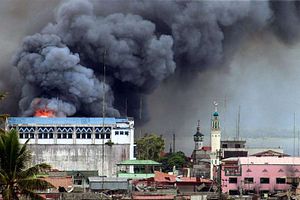The Moro insurgency is one of the longest-running conflicts in the southern Philippines. Although several peace agreements have been brokered with the help of third parties, progress on implementation has largely stalled due to intermittent ceasefire violations and a lack of political support.
But there is now renewed impetus for the peace process. For months, President Rodrigo Duterte has been seen building support for the long-stalled Bangsamoro Basic Law (BBL), including meeting with various lawmakers to set the bill in motion. While it is still in draft stage, the vision is to create the Bangsamoro Autonomous Region and grant the insurgents greater economic and political powers.
The current Bangsamoro agenda takes place against the backdrop of the Marawi siege. Although pro-Islamic State (ISIS) militants have been ousted from Marawi City, local recruitment efforts are still ongoing. Abu Dar, one of the Maute leaders who escaped from Marawi, is said to be leading the recruitment. This has Duterte worried that hardline Moro rebels who share familial ties with local ISIS-affiliated terrorist groups may return to violence if they are dissatisfied with the peace process.
The danger has already been highlighted by reports alleging that the pro-ISIS groups that laid siege to Marawi City have been aided by ISIS sympathizers within the Moro Islamic Liberation Front (MILF) and Moro National Liberation Front (MNLF). These insurgents possess stockpiles of weapons and well-trained fighters, which will help defeated jihadists regroup. This explains why former MILF guerrilla commander Abu Turaipe, who leads the pro-ISIS Jamaah Al Muhajirin wal Anshor (JMA), is now targeting the MILF, believing that this would fracture the group and encourage dissenters join the jihad war in Southeast Asia.
To be sure, the mainstream Moro insurgents have no Islamist tendencies. In fact, the MILF and MNLF are each leading a counterterrorism task force to prevent jihadist elements from gaining a foothold in Mindanao. And when pro-ISIS militants laid siege to Marawi City, the MILF alliance with the military was integral to rescue and humanitarian missions. Crucially, the group also helped prevent the conflict from spilling over to neighboring towns.
Moreover, there has been no incidence of ceasefire violation by the Moro rebels since 2015. This owes to ceasefire mechanisms (e.g., the Coordinating Committee on Cessation of Hostilities and the Ad-Hoc Joint Action Group) and the de-escalating efforts of the International Monitoring Team comprising soldiers from Malaysia, Brunei, and Indonesia and conflict resolution experts from Japan, Norway, and the European Union.
The Moro rebels’ contributions in the fight against ISIS and their commitment to the peace process are seen as signs of good will and have helped earn them the political capital needed to finalize the peace process. Members of the Senate majority bloc have thrown their support behind the Bangsamoro Basic Law (BBL) as they believe this would “bring peace” to Mindanao. The House of Representatives, dominated by Duterte’s allies, is also expected to support the measure. Even though there will be some delay, the Philippine Congress will likely pass the BBL by March 2018.
Still, the BBL will likely be challenged by the Supreme Court as it contains some unconstitutional elements. Even if the BBL is ratified by the Constitution, there are several reasons why the Bangsamoro political entity may not live up to expectations. First, the future of the Bangsamoro is still unclear, as Duterte is also mulling federalism for the Philippines as a whole. Furthermore, the MILF and MNLF have been armed insurgents for several decades, which raises questions as to whether they can truly abandon their violent roots and coexist as peaceful political organizations.
Adding to this, there are opposing views on peace resolutions. Whereas Nur Misuari’s MNLF wants to enhance the current Autonomous Region in Muslim Mindanao (ARMM), the MILF led by Al Haj Murad Ebrahim and MNLF factions led by Yusoph Jikiri and Muslimin Sema are pushing for the BBL to be signed into law – and doing so would mean abolishing the ARMM.
What’s happening now is not new – peace deals forged in the past were all rejected by factions of the insurgent movement, leading to the rise of breakaway groups like the MILF and Bangsamoro Islamic Freedom Fighters (BIFF). Hence, if differences in peace demands cannot be reconciled, other radicalized offshoots may emerge in the future.
Even if the MILF and MNLF manage to reach a consensus on this matter, the growing nexus of jihadist groups and foreign terrorists, as well as continued attacks by the New People’s Army, means that Mindanao will still be rocked by violence and instability. This will only deepen the economic problems in the region, thus perpetuating extremism and endangering the regional security situation.
Lau Seng Yap is a security risk analyst at GlobalMomentum Pte Ltd. He specializes in analyzing geopolitical risks and security threats in the Asia-Pacific region.

































